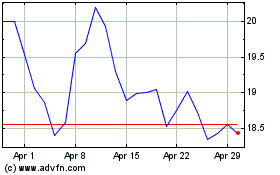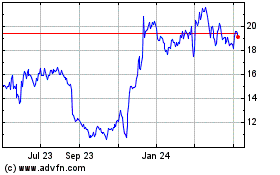By Suzanne Kapner
With just two weeks until Black Friday -- the day after
Thanksgiving that kicks off the holiday buying season -- executives
at the nation's biggest department stores said Thursday they are
seeing signs that consumers are turning their attention from voting
to shopping.
Macy's Inc. and Kohl's Corp. cited improving sales trends and
gave upbeat outlooks for the key holiday season, despite posting
another quarter of declining sales as the chains struggle with
changing shopping habits and competition from discounters.
Nordstrom Inc., meanwhile, reported a sales increase and lifted
its financial targets for the year.
"We have momentum coming out of October," Kohl's Chief Executive
Kevin Mansell said. "We feel we're very well positioned for the
upcoming holiday season."
Shares of the companies rallied in Thursday's trading, giving a
lift to other retail stocks.
Mr. Mansell was concerned about an election hangover, due to
uncertainty about President-elect Donald Trump's agenda. But Macy's
CEO Terry Lundgren said: "To have a group of the population feeling
like their voices have been heard is a positive thing." With wages
rising and unemployment low, he added, "there is a potential for
consumers to spend in the fourth quarter."
Mr. Mansell said better inventory management could help shield
the company from seasonal or political volatility.
"We are doing things with an eye to the long-term," he said.
This should "continue to benefit us regardless of whether or not
you think the consumer is in a buying mood for holiday or is still
not so much."
A more complete picture of the consumer mind-set will emerge
next week when other large chains such as Wal-Mart Stores Inc.,
Target Corp. and Home Depot Inc. report their latest results.
Perhaps even more important than the impact of the election on
retail sales is the unseasonably warm weather across much of the
country.
Inventory levels are in good shape compared with a year ago but
that could change if cold weather doesn't materialize, leading to
"another over-inventoried, heavily-promotional holiday season,"
Citi analyst Kate McShane wrote in a note to clients.
Consumer spending has been strong this year as Americans have
benefited from low inflation, rising wages and high levels of
employment. At the same time, people are shifting spending online
and making fewer trips to stores, according to retail
executives.
The National Retail Federation has projected that holiday sales
-- online and in stores -- excluding autos, gas and restaurant
sales will increase 3.6% to $655.8 billion this year. Last year,
holiday spending fell short of the NRF's 3.7% forecast, coming in
at 3.0%.
Shoppers increasingly are opting to make purchases online,
especially at Amazon.com Inc. or at fast-fashion chains such as
H&M Hennes & Mauritz AB, leaving department stores
struggling with lower foot traffic. The NRF projected that
non-store sales, including online purchases, will increase between
7% and 10% to as much as $117 billion.
Both Macy's and Kohl's have tried to adapt. Macy's has been
closing weaker stores and adding kiosks that sell Apple Inc.
watches or other electronics. Kohl's has brought in more national
brands, such as Nike Inc. and American Girl dolls. But both still
rely on heavy discounts to drive foot traffic.
Neil Saunders, the chief executive of Conlumino, a retail
research firm, noted that Macy's made just 2 cents for every $1 in
revenue in the latest quarter. The results, Mr. Saunders said,
"show a company grappling with what looks like a terminal
decline."
Some brands, such as Michael Kors Holdings Ltd. and Ralph Lauren
Corp., that historically have relied heavily on department stores
are pulling back from those chains in an effort to sell more goods
at full price. On Thursday, Ralph Lauren reported that sales to
department stores fell 10% in its latest quarter, while Michael
Kors said sales in the channel dropped 18.4%.
Macy's, Kohl's and Saks Fifth Avenue, which is owned by Hudson's
Bay Co., on Thursday all reported lower sales at existing stores
for the latest quarter. However, the chains reduced inventories,
putting the companies on stronger footing heading into the holidays
than last year.
Nordstrom executives said lower inventory levels at their
stores, and throughout the industry, are resulting in fewer
discounts and more stable margins. Several of the department stores
had to resort to heavy discounting to clear unsold goods that piled
up during the 2015 holiday season.
Shares of Macy's gained 5.6% on Thursday, while Kohl's rose
11.5%, and Nordstrom climbed 7.2%. Shares of J.C. Penney Co., which
reports earnings Friday morning, jumped 5.4%.
People have been spending less on clothing, handbags and other
items traditionally sold in department stores, and shelling out
more on travel, dining out and other entertainment.
Mr. Lundgren, of Macy's, said the company's strategy of adding
more exclusive products has helped apparel sales recover. "We're
taking share in that category," he said.
The company also has been shrinking its footprint. On Thursday,
Macy's struck a deal with real-estate investor Brookfield
Properties to redevelop up to 50 locations. Financial terms weren't
disclosed.
During the summer, Macy's said it would shut 100 stores, about
15% of its base, in addition to 40 closures announced earlier this
year.
Overall, Macy's reported a third-quarter profit of $17 million,
down from $118 million a year earlier, hurt by restructuring costs.
Sales fell 4.2% to $5.63 billion.
Kohl's profit rose 22% to $146 million, while revenue fell 2.3%
to $4.33 billion.
--Joshua Jamerson, Ezequiel Minaya and Imani Moise contributed
to this article.
Write to Suzanne Kapner at Suzanne.Kapner@wsj.com
(END) Dow Jones Newswires
November 11, 2016 02:47 ET (07:47 GMT)
Copyright (c) 2016 Dow Jones & Company, Inc.
Macys (NYSE:M)
Historical Stock Chart
From Mar 2024 to Apr 2024

Macys (NYSE:M)
Historical Stock Chart
From Apr 2023 to Apr 2024
